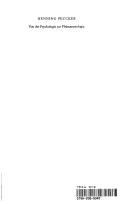| Listing 1 - 10 of 14 | << page >> |
Sort by
|
Book
ISBN: 9780199680511 Year: 2013 Publisher: Oxford : Oxford University Press,
Abstract | Keywords | Export | Availability | Bookmark
 Loading...
Loading...Choose an application
- Reference Manager
- EndNote
- RefWorks (Direct export to RefWorks)
Eschatology. --- Existential phenomenology. --- Eschatologie --- Phénoménologie existentielle --- Heidegger, Martin,
Book
ISBN: 9782847430233 2847430237 Year: 2009 Publisher: Paris: Pétra,
Abstract | Keywords | Export | Availability | Bookmark
 Loading...
Loading...Choose an application
- Reference Manager
- EndNote
- RefWorks (Direct export to RefWorks)
Book
ISBN: 9782711622238 2711622231 Year: 2010 Publisher: Paris: Vrin,
Abstract | Keywords | Export | Availability | Bookmark
 Loading...
Loading...Choose an application
- Reference Manager
- EndNote
- RefWorks (Direct export to RefWorks)
Bien que vivant au quotidien dans l’existence, nous n’avons que très rarement le « sentiment » de l’existence : nous faisons quelque chose, nous allons et venons, et par là faisons partie de ce tout qu’est l’existence sans toutefois y penser véritablement. A de rares moments cependant, contemplant un paysage du haut d’une montagne, regardant le ciel étoilé, nous réalisons non sans frissonner qu’une chose comme l’existence existe. Nous nous extirpons alors de l’affairement pour nous plonger dans l’intégralité de cette vaste existence : nous existons avec l’existence, non parce que le champ de notre vision se trouverait être considérablement élargi, mais parce que c’est le fait même d’embrasser l’espace qui nous libère et nous permet d’« entendre » ce passage de l’existence, son écoulement.
Existential phenomenology --- Time --- Philosophy, Romanian --- Phénoménologie existentielle --- Temps (Philosophie) --- Philosophie roumaine --- Philosophy --- Phénoménologie existentielle --- Existence (philosophie) --- Temps (philosophie)
Book
ISBN: 2800410159 9782800410159 Year: 1991 Publisher: Bruxelles: Éditions de l'Université de Bruxelles,
Abstract | Keywords | Export | Availability | Bookmark
 Loading...
Loading...Choose an application
- Reference Manager
- EndNote
- RefWorks (Direct export to RefWorks)
Fenomenologie --- Phénoménologie --- Psychologie --- Subjectivity --- Existential phenomenology --- Existential psychology --- Phenomenological psychology --- Subjectivité --- Phénoménologie existentielle --- Psychologie existentielle --- Psychologie phénoménologique --- Psychological phenomenology --- Psychology, Phenomenological --- Personality --- Phenomenology --- Psychology --- Subjectivité --- Phénoménologie existentielle --- Psychologie phénoménologique --- Phenomenological psychology.
Book
ISBN: 287060114X 9782870601143 Year: 2004 Volume: 9 Publisher: Bruxelles Ousia
Abstract | Keywords | Export | Availability | Bookmark
 Loading...
Loading...Choose an application
- Reference Manager
- EndNote
- RefWorks (Direct export to RefWorks)
Existentialisme --- Sartre, Jean-Paul --- Ontology. --- Existentialism. --- Existential phenomenology. --- Nothing (Philosophy) --- Ontologie --- Phénoménologie existentielle --- Néant (Philosophie) --- Sartre, Jean-Paul, --- Criticism and interpretation. --- Phénoménologie existentielle --- Néant (Philosophie) --- Sartre, Jean-Paul, 1905-1980 --- Ontology --- Existentialism --- Existential phenomenology
Book
ISBN: 9789004299740 9789004299757 9004299742 9004299750 Year: 2015 Volume: 283 Publisher: Boston Brill-Rodopi
Abstract | Keywords | Export | Availability | Bookmark
 Loading...
Loading...Choose an application
- Reference Manager
- EndNote
- RefWorks (Direct export to RefWorks)
Integrated Truth and Existential Phenomenology: A Thomistic Response to Iconic Anti-Realists in Science relates an existential phenomenology to modal reasoning. By this reasoning, rooted in a consciousness of phenomena in themselves, a Thomistic realism is advanced wherein scientific inquiry yields objective truth and presupposes a causal principle. This principle, as an inferably true modality, strictly implies a first cause. And this cause as a supreme norm, causally created human nature as it ought to be. So with no naturalistic fallacy, a naturalistic ethics is inferred from our psycho-biological nature that also informs art and politics. Politics, as the institutionalization of ethics, is inferable from ethical prescriptions that are as certifiably true as the descriptions of science that inform it.
Existential phenomenology. --- Existentialism. --- Phenomenology. --- Science --- Anti-realism. --- Phénoménologie existentielle --- Existentialisme --- Phénoménologie --- Sciences --- Antiréalisme --- Philosophy. --- Philosophie --- Thomas, --- Existential phenomenology --- Existentialism --- Phenomenology --- Anti-realism --- Philosophy --- Thomas Aquinas, --- Phénoménologie existentielle --- Phénoménologie --- Antiréalisme --- Thomas, - Aquinas, Saint, - 1225?-1274
Multi
ISSN: 00791350 22150331 ISBN: 9781402087981 9781402091780 9781402087974 9781402091773 1402087977 140209177X Volume: 189-190 Publisher: The Hague
Abstract | Keywords | Export | Availability | Bookmark
 Loading...
Loading...Choose an application
- Reference Manager
- EndNote
- RefWorks (Direct export to RefWorks)
If I am asked in the framework of Book 1, "Who are you?" I, in answering, might say "I don't know who in the world I am." Nevertheless there is a sense in which I always know what "I" refers to and can never not know, even if I have become, e.g., amnesiac. Yet in Book 2, "Who are you?"has other senses of oneself in mind than the non-sortal "myself." For example, it might be the pragmatic context, as in a bureaucratic setting; but "Who are you? Or "Who am I?" might be more anguished and be rendered by "What sort of person are you" or "What sort am I?" Such a question often surfaces in the face of a "limit-situation," such as one's death or in the wake of a shameful deed where we are compelled to find our "centers," what we also will call "Existenz." "Existenz" here refers to the center of the person. In the face of the limit-situation one is called upon to act unconditionally in the determination of oneself and one's being in the world. In this Book 2 we discuss chiefly one's normative personal-moral identity which stands in contrast to the transcendental I where one's non-sortal unique identity is given from the start. This moral identity requires a unique self-determination and normative self-constitution which may be thought of with the help of the metaphor of "vocation." We will see that it has especial ties to one's Existenz as well as to love. This Book 2 claims that the moral-personal ideal sense of who one is linked to the transcendental who through a notion of entelechy. The person strives to embody the I-ness that one both ineluctably is and which, however, points to who one is not yet and who one ought to be. The final two chapters tell a philosophical-theological likely story of a basic theme of Plotinus: We must learn to honor ourselves because of our honorable kinship and lineage "Yonder."
filosofie
---
Metaphysics
---
persoonlijkheidsleer
---
metafysica
---
existentialisme
---
godsdienstfilosofie
---
Psychology
---
metaphysics
---
Philosophy
---
Religious studies
---
Existential phenomenology.
---
Transcendentalism.
---
Phénoménologie existentielle
---
Transcendantalisme
---
EPUB-LIV-FT LIVHUMAI SPRINGER-B
---
Theory of knowledge
---
Academic collection
---
#BIBC:boekadm

ISBN: 0792301250 9780792301257 Year: 1989 Volume: 113 Publisher: Dordrecht: Kluwer Academic Publishers,
Abstract | Keywords | Export | Availability | Bookmark
 Loading...
Loading...Choose an application
- Reference Manager
- EndNote
- RefWorks (Direct export to RefWorks)
Philosophical anthropology --- Psychiatry --- Existential phenomenology --- Existentiële fenomenologie --- Philosophie phénoménologique --- Phénoménologie existentielle --- Phénoménologie transcendantale --- Psychiatrie --- Philosophy --- Philosophie --- Existential phenomenology. --- Philosophy. --- -Academic collection --- Medicine and psychology --- Mental health --- Psychology, Pathological --- Existentialism --- Phenomenology --- Philosophy, Modern --- Phénoménologie existentielle --- Academic collection --- Phénoménologie --- Psychiatry - Philosophy.

ISSN: 02497980 ISBN: 2711616592 9782711616596 Year: 2004 Volume: *137 Publisher: Paris: Vrin,
Abstract | Keywords | Export | Availability | Bookmark
 Loading...
Loading...Choose an application
- Reference Manager
- EndNote
- RefWorks (Direct export to RefWorks)
Ontology --- Existential phenomenology --- Human body (Philosophy) --- Ontologie --- Phénoménologie existentielle --- Corps humain (Philosophie) --- Merleau-Ponty, Maurice, --- Philosophy, French --- French philosophy - 20th century --- Phénoménologie existentielle --- Merleau-Ponty, Maurice --- Criticism and interpretation --- Philosophy, French - 20th century --- Acqui 2006 --- Merleau-Ponty, Maurice, - 1908-1961 --- Merleau-Ponty, Jean Jacques Maurice, --- Merlō-Ponty, Mōris, --- Ponty, Jean Jacques Maurice Merleau-, --- Ponty, Maurice Merleau-, --- מרלו־פונטי, מוריס,

ISBN: 9783787316144 3787316140 Year: 2002 Publisher: Hamburg: Meiner,
Abstract | Keywords | Export | Availability | Bookmark
 Loading...
Loading...Choose an application
- Reference Manager
- EndNote
- RefWorks (Direct export to RefWorks)
Phenomenological psychology --- Existential phenomenology --- Psychologie phénoménologique --- Phénoménologie existentielle --- Husserl, Edmund, --- Phenomenology --- Mathematics --- Psychologism. --- Logic. --- Psychologism --- Logic --- History. --- Philosophy. --- Philosophy --- Psychologie phénoménologique --- Phénoménologie existentielle --- Logic of mathematics --- Mathematics, Logic of --- Argumentation --- Deduction (Logic) --- Deductive logic --- Dialectic (Logic) --- Logic, Deductive --- Intellect --- Psychology --- Science --- Reasoning --- Thought and thinking --- History --- Methodology --- Husserl, Edmund --- Husserl, Edmond --- Phenomenology - History. --- Mathematics - Philosophy. --- Mathematics - Philosophy --- Husserl, Edmund, - 1859-1938
| Listing 1 - 10 of 14 | << page >> |
Sort by
|

 Search
Search Feedback
Feedback About UniCat
About UniCat  Help
Help News
News